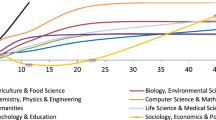Abstract
One of the responses to the demands of graduate education in the United States has been the development of faculty directors of graduate programs within academic departments. The title for this position varies widely, but it is most commonly called Graduate Program Director (GPD). The GPD serves at the departmental level and is key in the administration of graduate programs in the U.S. and in a number of other countries. However, little scholarly attention has been brought to examination of these positions although there has been acknowledgement that the faculty members holding them play key roles in student recruitment, socialization, retention, and program completion. This article is the first presentation of multi-institutional survey data on faculty members serving in this role. The survey found that the role is only partially formalized. About half of the survey respondents reported that there were written job descriptions and university-wide policies related to this role. Survey respondents reported a wide range of responsibilities, but rather limited resources to assist them in this role.
Similar content being viewed by others
References
Ad Hoc Graduate Education Committee (1998). What do directors of graduate education do? Washington, DC: American Sociological Association.
Adelman, C. (2010). The US response to Bologna: Expanding knowledge, first steps of convergence. European Journal of Education, 45, 612–623.
Doyle, E. A. (1953). The status and functions of the department chairperson. Washington, DC: Catholic University of America Press.
Hancock, T. M. (2007). The business of universities and the role of department chair. International Journal of Educational Management, 21, 306–314.
Inamete, U. B. (2015). The academic discipline of management and the Bologna process: The impacts on the United States in a globalizing world. Vision: The Journal of Business Perspective, 19, 49–57.
Lovitts, B. (2001). Leaving the ivory tower: The causes and consequences of departure from doctoral study. Lanham, MD: Rowman & Littlefield.
Macfarlane, B. (2011). Professors as intellectual leaders: Formation, identity and role. Studies in Higher Education, 36, 57–73.
Middle States Commission on Higher Education (2019, April 30). Standard VII Governance, Leadership, and Administration. Retrieved from http://www.msche.org/standards/
Ortega, S. (2003). Enhancing the infrastructure of graduate education: The crucial role of the director of graduate studies. Journal for Higher Education Strategists, 1, 51–64.
Petersen, J.C., Chesak, L., Saunders, R.B., & Wiener, W.R. (2017). The central role of the director of graduate studies: Ten years of data from a mid-sized public university. Occasional Paper Series of the Council of Graduate Schools, Number 5, pp. i-10. Washington, DC: Council of Graduate Schools.
Roach, J. (1976). The academic department chairperson: Functions and responsibilities. Educational Record, 57, 13–23.
Siegel, L., Sowell, R., Sullivan, T., Tate, P., & Denecke, D. (2004). Organization and administration of graduate education. Washington DC: Council of Graduate Schools.
Tucker, A. (1981). Chairing the academic department: Leadership among peers. Washington, DC: American Council on Education.
Author information
Authors and Affiliations
Corresponding author
Additional information
Graduate Program Directors (GPDs) play a central role in the administration and success of graduate education in U.S. higher education institutions. They are the faculty members within an academic unit who are responsible for various activities that support the recruitment, admission, and retention of graduate students and attend to the continuing programs of graduate education. The authors of this article are former graduate deans, who have interacted with graduate program directors and have studied their roles at various universities.
Publisher’s Note
Springer Nature remains neutral with regard to jurisdictional claims in published maps and institutional affiliations.
Rights and permissions
About this article
Cite this article
Wiener, W.R., Peterson, J.C. Strengthening the Role of Graduate Program Directors. Innov High Educ 44, 437–451 (2019). https://doi.org/10.1007/s10755-019-09480-y
Published:
Issue Date:
DOI: https://doi.org/10.1007/s10755-019-09480-y




